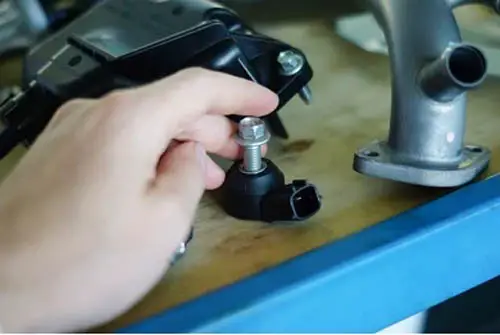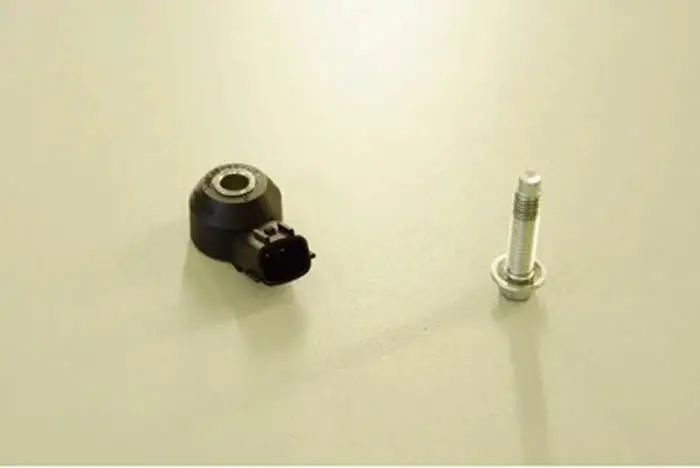
A knock sensor is a device used in automobiles to detect knocking or pinging noises in the engine. The sensor is usually attached to the engine block, and it uses sound waves to listen for knocking. When it detectives a knocking noise, it sends a signal to the engine control unit, which can then adjust the timing of the ignition and fuel injection to try to stop the knocking.
How long can I drive my car with bad knock sensor? This is a question that many car owners find themselves asking at some point. The answer, unfortunately, is not a straightforward one. There are a number of factors that can affect how long your car will run with a failed knock sensor. In this article, we’ll explore some of those factors and help you make an informed decision about when to replace your knock sensor.
If your car’s engine light is on and the car is stalling, you could have a bad detonation sensor. This article will help you find out how long can you drive with a bad knock sensor.
Related Post: How To Check If A Knock Sensor Is Bad? Fast & Easy Way
Symptoms Of A Bad Knock Sensor
The sign of a bad knock sensor may vary depending on the severity of the problem. Here are some of the most common signs to drive a car with bad detonation sensor:
- Check Engine Light: The engine warning light is an indicator that something is wrong with your car’s engine. The sensor failure will trigger the check engine light, and you’ll need to get the car checked out immediately.
- Poor Performance: Car with a bad knock sensor can cause your engine to run poorly, resulting in reduced acceleration, stalling, or rough idling.
- Reduced Fuel Economy: A faulty sensor can cause your car to consume more fuel than usual, resulting in reduced fuel efficiency.
- Engine Damage: If you continue to drive with a bad engine knock sensor, it can cause damage to the engine. This can lead to expensive repairs or even engine replacement.
Related Post: Top 5 Symptoms Of A Bad Knock Sensor: Don’t Ignore These!
How Long Can I Drive with A Bad Knock Sensor

The detonation sensor or knock sensor detects the engine’s vibrations and reduces acceleration until the defective knock sensor is replaced with a new knock sensor. Because the vehicle’s engine may run hot due to a defective detonation sensor, there is a potential that increased emissions will be created.
The Environmental Protection Agency does not allow vehicles to emit such high levels of pollution, which is why the reduced acceleration safety function was implemented. It is safe to drive with a malfunctioning detonation sensor, but only for a short distance. Otherwise, you may face engine problems and excessive exhaust emissions.
One of the features that distinguish the current generation of internal combustion engines from the previous generation is the detonation sensor. The knock sensor will typically be your computer’s “ear” on the engine; while it is vital for optimization.
You can drive the car safely if the engine starts and runs yet a warning light or fault code indicates a broken detonation sensor. However, the engine’s performance may be affected. The purpose of a knock/detonation sensor is to allow the ignition timing to be retarded to the best possible setting. By retarding spark timing, the detonation sensor will prevent preignition knock. If the electronics allow the engine to run, lesser octane fuel will be assumed.
Unless the car is running on low-octane fuel or has an old engine, the detonation sensor is unnecessary. If “pinging” from fuel with a low octane rating is detected, the detonation sensor delays ignition time. A faulty knock/detonation sensor may also prevent the engine from accelerating correctly while driving on the highway, resulting in a loss of fuel efficiency. Your vehicle will most likely lose power after the computer realizes the detonation sensor isn’t working properly.
Related Post: Is It Safe To Drive With A Faulty Knock Sensor? Read This!
The Consequences Of Driving With A Bad Knock Sensor
Driving with a defective knock sensor can cause severe consequences. Here are some of the potential risks:
- Reduced Engine Performance: A defective knock sensor actually can cause your engine to misfire, resulting in reduced performance.
- Engine Damage: A defective knock sensor can cause significant damage to your engine, potentially making it worth repairing or even engine replacement.
- Increased Emissions: If your car’s knock sensor is faulty, it can cause increased emissions, which can overheat the environment.
- Reduced Fuel Economy: A defective knock sensor can cause your car to consume more fuel than usual leading to bad fuel mileage.
How To Fix A Bad Knock Sensor
If you suspect that your knock sensor is faulty, it’s essential to get your car to a repair shop to ensure that it is checked out by a mechanic. You can also check the service manual of the vehicle. Here are some of the steps involved in fixing the problem:
- Diagnose the Problem: The first step in fixing a defective knock sensor is to diagnose the problem. A qualified mechanic will use specialized tools to determine the cause of the internal engine components problem.
- Replace the Knock Sensor: If your knock sensor is faulty, you will need to change the knock sensor. This is a relatively straightforward process and can be done quickly by a qualified mechanic.
- Clear the Codes: After that, the codes in the car’s computer should be cleared. This can be done using a diagnostic tool.
- Test Drive the Car: After successfully replacing a knock sensor at the car repair, it needs to be test-driven to ensure that everything is working correctly.
Conclusion
In conclusion, a defective detonation/knock sensor can cause your car to run poorly, and the longer it goes unchecked, the more damage it can cause. It is important to get your car checked as soon as possible if you suspect a problem with the knock sensor. A qualified mechanic will be able to diagnose and repair any issues that may be present. If left untreated, you could experience engine problems which could lead to costly repairs or even require a new engine altogether.
Frequently Asked Questions:
The average knock sensor replacement cost varies based on the make and model of the car. However, it typically ranges from $150 to $500.
Engine detonation, also known as engine knock, is usually caused by incorrect air and air-fuel mixture, engine timing, or a faulty spark plug.
After replacing the knock sensor, you can reset the error code by disconnecting the negative battery cable for a few minutes, which will clear the PCM’s memory, and the replacement sensor will work properly. If it didn’t solve the problem, then you will have to clear it with the OBD-2 scan tool.
Yes, a faulty knock sensor can have an impact on your gas efficiency. If the sensor isn’t working correctly, it may cause the engine to adjust the fuel mixture from the wrong instruction of the power train control module (PCM), the resulting decrease in gas miles per gallon but it also depends on other factors like the number of cylinders of the vehicle.
The knock sensor is a piezoelectric device that finds ignition or knocking in the engine. This information is transmitted to the engine control computer, which adjusts the air and fuel mixture and engine timing.
If you’ve recently had your car’s knock sensor replaced, but you’re still experiencing issues with the computer and the vehicle’s performance, then a new detonation sensor could be the culprit. It’s possible that the new detonation sensor wasn’t installed properly or that there’s another issue with the engine or transmission. To diagnose the problem, you may need to take your vehicle to a mechanic or take the car to a dealership for further inspection. In the meantime, if you notice that your car isn’t driving like it used to, particularly upon acceleration, be sure to take it easy and don’t press on the gas pedal hardly. Depending on the severity of the issue, it may be safer to avoid driving the car altogether until the problem is resolved.
Sign Up




